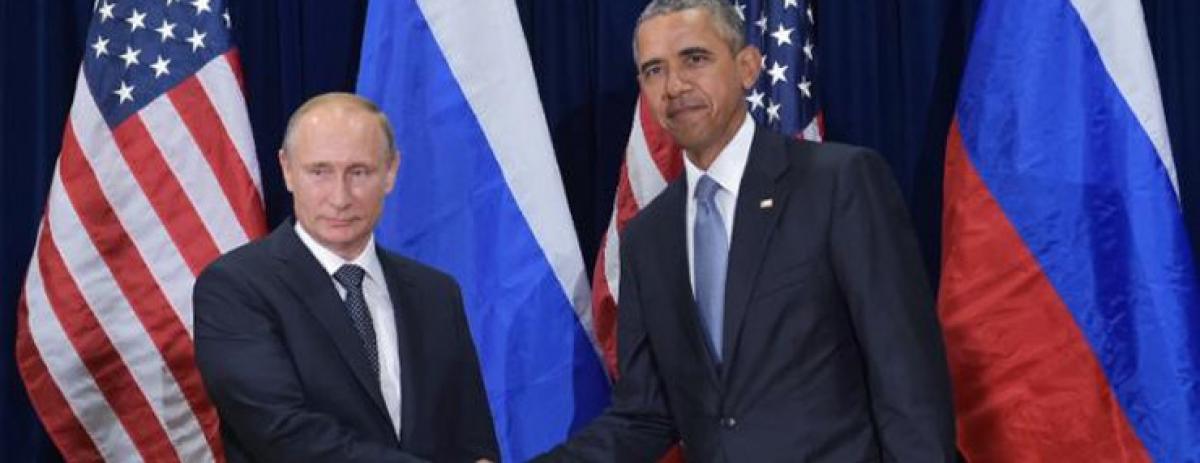Live
- Gahlot resignation: Delhi Congress calls AAP a sinking ship
- Consultative body on doctors' walkout fails to narrow differences in South Korea
- Honouring bravehearts: Army commemorates Nuranang Day
- 40,000 aspirants participate in army recruitment rallies across Jammu division
- Nigerian President Tinubu lauds PM Modi's efforts to amplify concerns of Global South
- Congress in Himachal to hold event in Bilaspur to mark two years at helm
- Hitaashee takes third title of the season, wins 14th leg of WPGT
- Group-3 exams in Wanaparthy district peacefully*
- Shraddha Das reigns as a fashion icon
- ‘Sarangapani Jathakam’ teaser set for Nov 21st release
Just In

x
Highlights
US President Barack Obama and Russian President Vladimir Putin clashed on Monday over their competing visions for war-ravaged Syria, with Obama urging a political transition to replace the Syrian president but Putin warning it would be a mistake to abandon the current government.
US President Barack Obama and Russian President Vladimir Putin clashed on Monday over their competing visions for war-ravaged Syria, with Obama urging a political transition to replace the Syrian president but Putin warning it would be a mistake to abandon the current government.
.jpg)
Obama and Putin’s dueling speeches at a United Nations General Assembly summit served as a public preview of their private meeting late Monday. The sit-down marks their first face-to-face encounter in nearly a year and comes amid escalating Russian military engagement in Syria.
Obama said he was open to working with Russia, as well as Iran, to bring Syria’s civil war to an end. He called for a “managed transition” that would result in the ouster of Syrian President Bashar Assad, whose forces have clashed with rebels for more than four years, creating a vacuum for the Islamic State and other extremist groups.
“We must recognise that there cannot be, after so much bloodshed, so much carnage, a return to the prewar status quo,” Obama said.
Putin, however, urged the world to stick with Assad, arguing that his military is the only viable option for defeating the Islamic State.
“We believe it’s a huge mistake to refuse to cooperate with the Syrian authorities, with the government forces, those who are bravely fighting terror face-to-face,” Putin said.
Obama and Putin’s disparate views of the grim situation in Syria left little indication of how the two countries might work together to end a conflict that has killed more than 250,000 people and resulted in a flood of refugees.
Despite Obama’s staunch opposition to Assad remaining in power, the US has struggled to energize a political process to push him from power. Russia has long been a major obstacle, shielding Assad from U.N. sanctions and continuing to provide the Syrian government with weapons.
In fact, Russia has appeared to deepen its support for Assad in recent weeks, sending additional military equipment and troops with the justification that it is helping the government fight the Islamic State. The military buildup has confounded U.S. officials, who spent the summer hoping Russia’s patience with Assad was waning and political negotiations could be started.
While Putin didn’t call out the US by name, he criticized efforts to arm “moderate” rebels in Syria, saying Western-backed fighters have later come to join the Islamic State.
The US has little to show for its efforts to build a moderate Syrian ground force that can effectively fight the extremists. A $500 million Pentagon program was supposed to train and equip more than 5,000 fighters, but has instead successfully produced only a handful.
Obama and Putin each framed his case for Syria’s future in the context of a broader approach to the world, launching veiled criticisms at each other.
The US president criticised nations that believe “might makes right,” and he sought instead to highlight the benefits of diplomacy. He touted his administration’s efforts to restore ties with Cuba after a half-century freeze and the completion of a nuclear accord with Iran, noting that Russia was a key partner in negotiating the Iran deal.
Putin, without naming the United States, accused Washington of trying to enforce its will on others and mulling a possible reform of the UN, which he suggested stands in the way of the perceived US domination.
“After the end of the Cold War, the single center of domination has emerged in the world,” Putin said. “Those who have found themselves on top of that pyramid were tempted to think that since they are so strong and singular, they know what to do better than others and it’s unnecessary to pay any attention to the UN.
Obama and Putin briefly shook hands during a leaders’ lunch that followed the morning of speeches. Though they were seated at the same table, with only UN secretary general Ban Ki-moon between them, the presidents did not appear to speak.
Obama and Putin have long had a strained relationship, with ties deteriorating to post-Cold War lows after Russia annexed Crimea from Ukraine and allegedly backed rebels in Ukraine’s east. The US has sought to punish Russia through a barrage of economic sanctions and diplomatic isolation, including no formal bilateral meetings between Obama and Putin.
US officials said the crisis in Syria, as well as the continued conflict in Ukraine, necessitated an in-person meeting with Putin. In addition to assessing the Russian leader’s maneuvers in Syria, officials said Obama would push Putin to fully implement a shaky peace deal for Ukraine, including allowing local elections to go forward next month without interference.
Obama, in his address to the UN, said Washington wasn’t seeking a return to the Cold War but couldn’t stand by while Ukraine’s sovereignty was being violated.
“If that happens without consequences in Ukraine, it could happen to any nation gathered here today,” Obama said.

Next Story
More Stories
ADVERTISEMENT
© 2024 Hyderabad Media House Limited/The Hans India. All rights reserved. Powered by hocalwire.com







